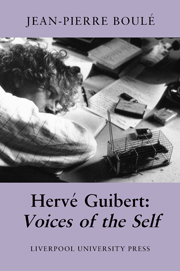Book contents
- Frontmatter
- Contents
- Acknowledgements
- List of Abbreviations
- Introduction
- 1 Youthful Writings
- 2 Photographic Writing
- 3 Towards the Novel
- 4 Image and Text
- 5 The ‘Novel’
- 6 ‘Autobiography’
- 7 Towards the roman faux
- 8 The roman faux
- 9 Thanatographical Writing
- 10 The Fictitious, the Fake or the Delirious
- Conclusion
- Notes
- Bibliography
- Index of Names
- Index of Notes
7 - Towards the roman faux
- Frontmatter
- Contents
- Acknowledgements
- List of Abbreviations
- Introduction
- 1 Youthful Writings
- 2 Photographic Writing
- 3 Towards the Novel
- 4 Image and Text
- 5 The ‘Novel’
- 6 ‘Autobiography’
- 7 Towards the roman faux
- 8 The roman faux
- 9 Thanatographical Writing
- 10 The Fictitious, the Fake or the Delirious
- Conclusion
- Notes
- Bibliography
- Index of Names
- Index of Notes
Summary
The books studied in this chapter vary from a collection of short stories (Mauve le vierge), a stage play (Vole mon dragon), two books without generic subtitle (Les Gangsters/Fou de Vincent), a novel (L'Incognito), and lastly a text between short story and novel (La chair fraîche). We can already see that between 1988 and 1990 Guibert uses a whole variety of genres. I shall therefore try to evaluate them with respect to the project of the voices of the self by concentrating on the identity of the narrator and on the narrative voices, and since the chapter is called ‘Towards the roman faux’, I shall also concentrate on the relationship between truth and falsehood.
MAUVE LE VIERGE/VOLE MON DRAGON
Published in 1988, Mauve le vierge bears the generic subtitle ‘nouvelles’ (‘short stories’). It was the first time a book of Guibert's bore the appellation ‘short stories’. But the question arises what generic differences there are between these short stories and the stories in Les Aventures singuliéres, especially when some of them like ‘Le désir d'imitation’ (‘The Desire to Imitate’) are called ’nouvelles’ (‘short stories’) by Guibert. The only difference in my view between Les Aventures singuliéres and Mauve le vierge is that there is a thread running through Les Aventures singuliéres, the singularity of the adventures, whereas there is none in Mauve le vierge, which allows Guibert to juxtapose more freely short stories with different subjects in the same volume.
- Type
- Chapter
- Information
- Hervé GuibertVoices of the Self, pp. 159 - 190Publisher: Liverpool University PressPrint publication year: 1999

